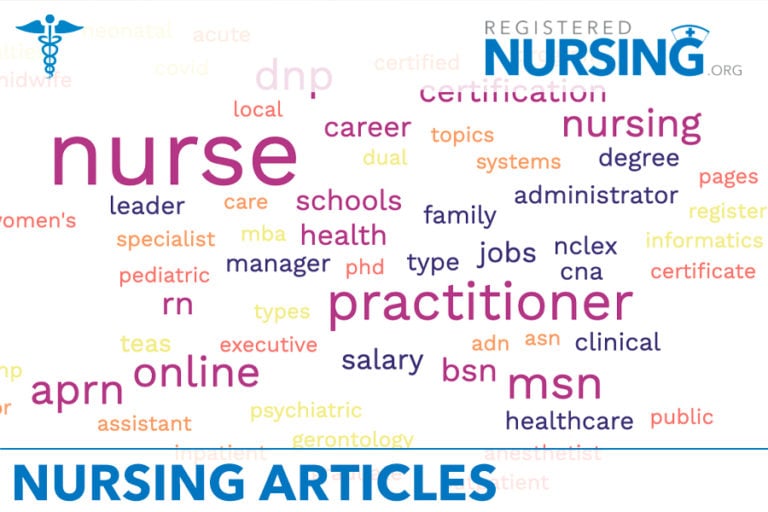Nursing Education Articles & Guides

12 Mins Read27 Feb 26
California is home to some of the most respected children’s hospitals in the world, including UCSF Benioff, Children’s Hospital Los…

12 Mins Read27 Feb 26
Missouri is in the middle of a mental health crisis that its workforce is not yet equipped to handle. The…

11 Mins Read26 Feb 26
Ohio is a strong state for Adult-Gerontology Nurse Practitioner (AGNP) training because it combines major academic medical centers with large…

12 Mins Read24 Feb 26
South Carolina's growing population, expanding healthcare systems, and persistent rural provider shortages make Family Nurse Practitioners (FNPs) essential across the…

12 Mins Read20 Feb 26
Texas is one of the largest healthcare markets in the country, making it a prime location to earn a Pediatric…

12 Mins Read20 Feb 26
Wisconsin is a strong place to train as a Psychiatric-Mental Health Nurse Practitioner (PMHNP) thanks to its mix of large…

12 Mins Read19 Feb 26
Virginia’s rapidly expanding older adult population, particularly concentrated in Northern Virginia, Hampton Roads, and the Richmond metro, creates urgent demand…

12 Mins Read17 Feb 26
The scenic state of Colorado is one of the most favorable places for Family Nurse Practitioner (FNP) training. With strong…

12 Mins Read17 Feb 26
With its diverse population, New York is one of the most dynamic states in the country to train to become…

12 Mins Read10 Feb 26
Connecticut offers a uniquely strong environment for Psychiatric-Mental Health Nurse Practitioner (PMHNP) training: a mix of major health systems, academic…

11 Mins Read10 Feb 26
Adult-Gerontology Nurse Practitioners (AGNPs) provide advanced care to adolescents, adults, and older adults, a population that accounts for a large…
Nursing Careers & Specialties Articles & Guides

12 Mins Read14 Nov 25
Texas is one of the best states in the nation to pursue a BSN to DNP (Doctor of Nursing Practice)…

12 Mins Read28 Jul 25
Colorado Springs hugs the eastern slope of Pikes Peak, and its skyline is dotted with healthcare landmarks, such as UCHealth…

8 Mins Read18 Jul 25
Each year, the Commonwealth Fund releases a detailed Scorecard on State Health System Performance, evaluating how well U.S. states deliver…

11 Mins Read13 Jun 25
Healthcare leadership offers diverse career opportunities, but two roles that often create confusion are nursing administrator and healthcare administrator positions.…

10 Mins Read06 Jun 25
As healthcare continues to evolve, so do the roles nurses play within the system. Advancements in technology, population health needs,…

9 Mins Read16 May 25
In today’s diverse healthcare landscape, the ability to communicate in multiple languages has evolved from a beneficial skill to an…

10 Mins Read05 May 25
The Advanced Practice Registered Nurse (APRN) Consensus Model is a regulatory framework designed to standardize how APRNs are educated, licensed,…

11 Mins Read02 May 25
Registered nurses looking to advance their careers, increase their earning potential, and specialize in areas they’re passionate about often turn…

11 Mins Read01 May 25
Private duty nursing is a growing and in-demand field offering a highly personalized approach to patient care. In 2025, as…

12 Mins Read25 Apr 25
California faces unique healthcare challenges that directly impact which nursing specialties are most critically needed throughout the state. From the…

9 Mins Read24 Apr 25
As the demand for qualified nurses continues to grow, so does the emphasis on patient safety, regulatory compliance, and workforce…
Nursing Life Articles & Guides

9 Mins Read04 Feb 26
Healthcare in the United States serves one of the most diverse populations in the world, yet the nursing workforce has…

12 Mins Read19 Nov 25
Internationally educated nurses (IENs) are a vital part of the U.S. healthcare system. With growing nursing shortages and increasing demand…

12 Mins Read18 Nov 25
Choosing the right nursing program is one of the most important decisions prospective RNs make, and the NCLEX-RN exam pass…

8 Mins Read18 Jul 25
Each year, the Commonwealth Fund releases a detailed Scorecard on State Health System Performance, evaluating how well U.S. states deliver…

10 Mins Read05 May 25
The Advanced Practice Registered Nurse (APRN) Consensus Model is a regulatory framework designed to standardize how APRNs are educated, licensed,…

11 Mins Read30 Apr 25
Working from home isn't just for tech professionals—nurses now have expanding opportunities to bring their clinical expertise into home-based roles.…

9 Mins Read24 Apr 25
As the demand for qualified nurses continues to grow, so does the emphasis on patient safety, regulatory compliance, and workforce…

12 Mins Read31 Mar 25
The United States continues to face a nationwide nursing shortage, and internationally educated nurses are helping bridge the gap. For…

8 Mins Read25 Feb 25
Retirement from nursing doesn't mean the end of professional fulfillment. Many retired registered nurses (RNs) find that they still have…

12 Mins Read03 Jan 24
What Is a Travel Nurse? A travel nurse is a registered nurse (RN) who accepts temporary assignments—usually lasting a few…

5 Mins Read29 Sep 23
After many opportunities and encouragement from your leadership team, you have decided to plunge into nursing leadership. Whether your first…
Nursing Articles & Guides Archives
2022 Articles
- NP, DNP, and Ph.D. in Nursing: How High-Level Nursing Salaries Compare to MD Salaries [Updated 2026]








